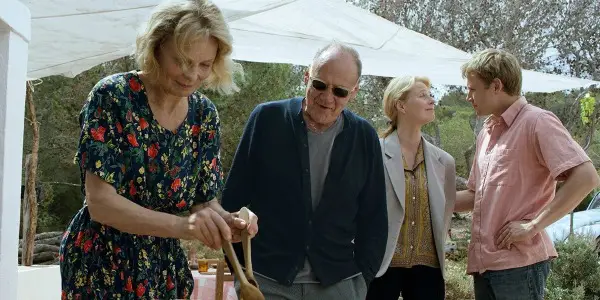AMNESIA: A Compellingly Quiet Take On A Party Island

It took me a while to discover the wonderful world…
When you think of Ibiza, the following images probably spring to mind; clubbing, all-night parties, raves, music, pumped up young people getting drop-dead drunk. Ibiza is loud, and youthful, and hopping.
But not in Amnesia.
Barbet Schroeder’s film presents a compellingly different take on the notorious party island. You’ll never see it in quite the same light again.
Amnesia
Martha (Marthe Keller) is a seventy-something German émigré who’s been living alone on Ibiza for decades. Though she is friendly and outgoing, she will resolutely not talk about her past. Jo (Max Riemelt) is a twenty-something DJ who’s moved to the famous party island in the hope of making it big.
The two meet one evening when Jo injures himself; Martha opens the first door he knocks on for help. As she is patching him up, they get to talking and soon become best friends, much to the amusement of Jo’s peers.
As their friendship progresses, Jo grows increasingly curious about Martha’s mysterious past. When she finally does divulge the secret she’s been keeping, it proves a test of their friendship, as does a visit from Jo’s mother (Corinna Kirchhoff) and grandfather (Bruno Ganz), the latter of whom has been keeping a big secret of his own.
Ibiza As… Peaceful?

Schroeder‘s Ibiza is not just quiet compared to the usual take we get on the island. It’s so quiet, peaceful, and (for a while at least), so sparsely populated at some points that it seems as though it’s not quite of this world.
There’s a grand portion of the film where Martha and Jo are the only two people we see on the island, and that gives Ibiza the feel of limbo. This is especially the case for Martha, who has been hiding from her past there for so long. To her, Ibiza is a sancturary, a safe place where she can live not in the past, but in an untroubled present.
Jo, on the other hand, has come to Ibiza for more conventional reasons. He wants to become a professional DJ, and the home of dance music seems like the most obvious place to achieve that goal. But he’s very receptive to exploring Martha’s Ibiza; the blinding white buildings against the beautiful blue sky, that endless sea and the aromatic flowers. Even if you don’t get anything else from Amnesia, the armchair travelling around Ibiza still makes it worth a watch!
Martha and Jo
For the first hour of the film, with the exception of some minor characters, Martha and Jo are our only company. And what charming company they make.
Martha is played by Marthe Keller, a Swiss actress with a career nearly twice as old as her co-star. Whilst you may not have heard her name before, she’s had a dazzling career, having worked alongside legends like Sydney Pollack, John Schlesinger, Billy Wilder, William Holden and Dustin Hoffman.
Her portrayal of Martha is fascinating. Before her reasons for having hidden out in Ibiza for so long are revealed, she is friendly but a little detached. If we didn’t already know she had a secret, we’d be able to tell from the faraway look on her face. The panic that comes with the revelations about her history are shattering; she is like a drowning woman bursting through the surface of apparently calm waters.
Max Riemelt, thirty-nine years Keller‘s junior, plays Jo. He’s had a much less storied career than Keller and plays a much less complicated character than Martha, and that’s what makes Jo’s attraction to her so endearing.
It’s not just a platonic attraction. Schroeder‘s screenplay and Riemelt‘s performance make it clear that he does have romantic feelings towards her, thought this is more an undercurrent than a real focus of the plot.

This relationship is treated with a sweet sensitivity by all involved. When Jo tries to make a move on Martha, she politely declines, saying “We’ve already been everything we needed to be for each other.”
She’s right. Martha and Jo’s friendship is just what they both need to help them move on to the next stage in their lives. It’s a genuine pleasure to see the unusual bond between them develop.
German Issues
As Amnesia enters its third act, and we finally learn Martha’s secret, it becomes clear that the ensuing discussion will only be understood fully by a German audience.
That’s not to say there’s nothing there for international viewers. I’m wary of giving too much away, though Martha’s secret is easily deduceable by the time it’s revealed; all I’ll say is that it relates to World War 2.
Jo’s mother and grandfather come to visit Jo, with the intention of bringing him back to Germany. At dinner with Martha, the four get to talking about WW2, memories and oft-repeated anecdotes get dissected, secrets are revealed, and long covered wounds ripped open. After the dinner, Jo’s family aren’t able to look at each other the same way they did before.

The conversation these four people have is specifically German. It deals with specifically German issues, and specifically German guilt. I’m sure that a German viewer would have been far more, or at least differently, affected by these scenes than I was, as a British viewer.
All I can tell you is what I got out of it, as an outsider.
Firstly, Bruno Ganz‘s performance is extraordinary, but I would have expected nothing less from arguably the world’s greatest living actor. He has only around fifteen minutes of screen time, but whilst he’s there he holds you completely transfixed. Few other actors could have invited as much sympathy towards such a troubled, and troubling character.
The final act contains the real question of the film, and that transcends borders. What is more honourable for someone who just can’t face a shameful past- to run away from it, or to lie about it? And which one of those options makes it easier to get through the days?
This third act confrontation, which makes a startling change of pace from the hour that preceded it, digs into that question with the sharpest of claws. There are no villains there, just diametrically opposed methods of coping with a trauma. And whilst the milieu of this debate will be fully relatable only to Shroeder’s country-people, the heartfelt performances and the eloquent treatment of the difficult subject matter, and the ultimately healing conclusion will touch anyone who watches.
Conclusion
It’s been two years since Amnesia premiered at Cannes, and the film is only now due for release in America.
That long wait for US distribution seems to be no reflection on Amnesia‘s quality, but rather it’s cultural specificity. There’s no question that due to its historical background and the complexities it dissects, Amnesia will have a bigger effect on German audiences than those of other nationalities.
There’s still so much here for non-Germans to enjoy. Compelling performances from Keller and Riemelt, and a stunning one from Ganz. A different take on Ibiza, which lets you indulge in the pleasures of armchair tourism. And a riveting discussion on how people and countries deal with shameful pasts.
Amnesia is a quiet, thoughtful gem.
What other films have you seen that use famous locations in unusual ways?
Amnesia opens in the US on July 21st. For all other upcoming release dates, click here.
Does content like this matter to you?
Become a Member and support film journalism. Unlock access to all of Film Inquiry`s great articles. Join a community of like-minded readers who are passionate about cinema - get access to our private members Network, give back to independent filmmakers, and more.
It took me a while to discover the wonderful world of cinema, but once I did, everything just fell into place.












